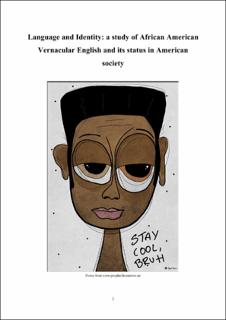| dc.contributor.advisor | Thengs, Kjetil Vikhamar | |
| dc.contributor.author | Ueland, Ane | |
| dc.date.accessioned | 2020-08-04T11:11:08Z | |
| dc.date.available | 2020-08-04T11:11:08Z | |
| dc.date.issued | 2020-05 | |
| dc.identifier.uri | https://hdl.handle.net/11250/2670762 | |
| dc.description | Master's thesis in Literacy studies | en_US |
| dc.description.abstract | The present thesis aimed to explore the relationship between language and identity with a particular focus on the status of African American Vernacular English in the American society. The research questions that were addressed in this research study were: 1. «How are Americans’ speaking habits influenced by their ethnicity?» 2. «What are Americans’ perception of African American Vernacular English, and how is this related to their general opinion about the American identity?» 3. «How do Americans react to the more frequent use of African American Vernacular English in today’s society?».
In order to address the research questions, this thesis made use of a quantitative methodology. This study was based on the results from an online survey conducted in the USA, consisting of a total of 36 questions. Each question contained a statement that was rated by the from 1 (disagree) to 5 (agree). A total of 173 participants took part in the survey. The data was analyzed according to four social factors: gender, age, ethnicity, and geography.
It is difficult to provide a general conclusion on this survey based on the number of participants compared to the overall population in America. However, considering the variety in the demographics of the participants, this thesis could provide an indication based on the results. The overall result from the participants are relatively indecisive, but when looking at the different social factors it shows a more nuanced picture of AAVE in American society. The findings indicated that women tend to use ethnic dialects less than men. The findings also gave an indication that the age group 18-29-year-olds was open to and accepting of AAVE. The 55+ year-olds, on the other hand, were more skeptical of AAVE and its use in contemporary society. African Americans had an ambivalent relation to AAVE. African American participants expressed that the way they speak is part of their identity, and found it offensive that other ethnic groups used features of AAVE. However, 1/4 of the African American stated that they code-switch. | en_US |
| dc.language.iso | eng | en_US |
| dc.publisher | University of Stavanger, Norway | en_US |
| dc.relation.ispartofseries | Masteroppgave/UIS-HF-IKS/2020; | |
| dc.rights | Navngivelse 4.0 Internasjonal | * |
| dc.rights.uri | http://creativecommons.org/licenses/by/4.0/deed.no | * |
| dc.subject | språk | en_US |
| dc.subject | African American Vernacular English | en_US |
| dc.subject | American pop culture | en_US |
| dc.subject | identity | en_US |
| dc.subject | language | en_US |
| dc.subject | ethnicity | en_US |
| dc.subject | sosiolingvistikk | en_US |
| dc.subject | literacy studies | en_US |
| dc.subject | lesevitenskap | en_US |
| dc.title | Language and identity: a study of African American Vernacular English and its status in American society | en_US |
| dc.type | Master thesis | en_US |
| dc.subject.nsi | VDP::Humaniora: 000::Språkvitenskapelige fag: 010 | en_US |

